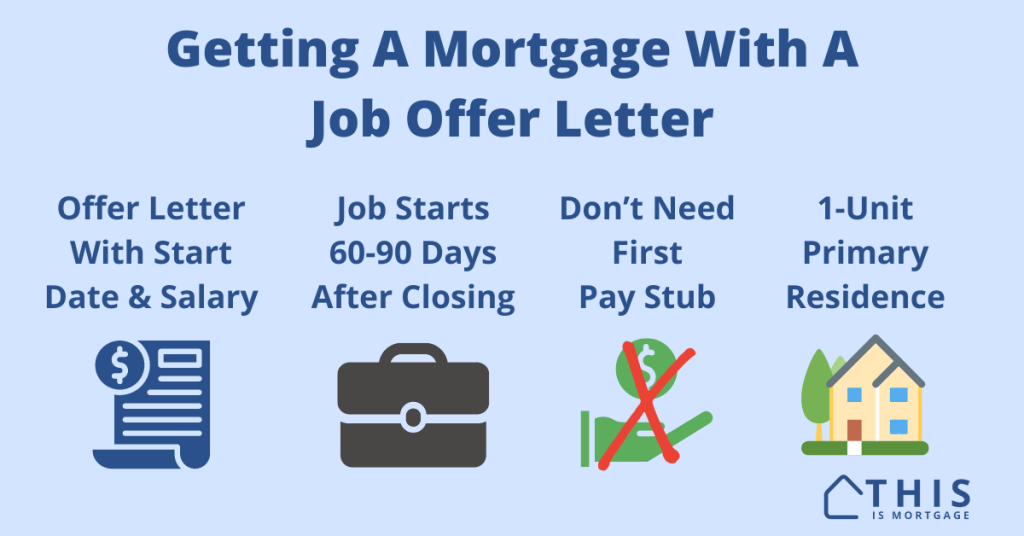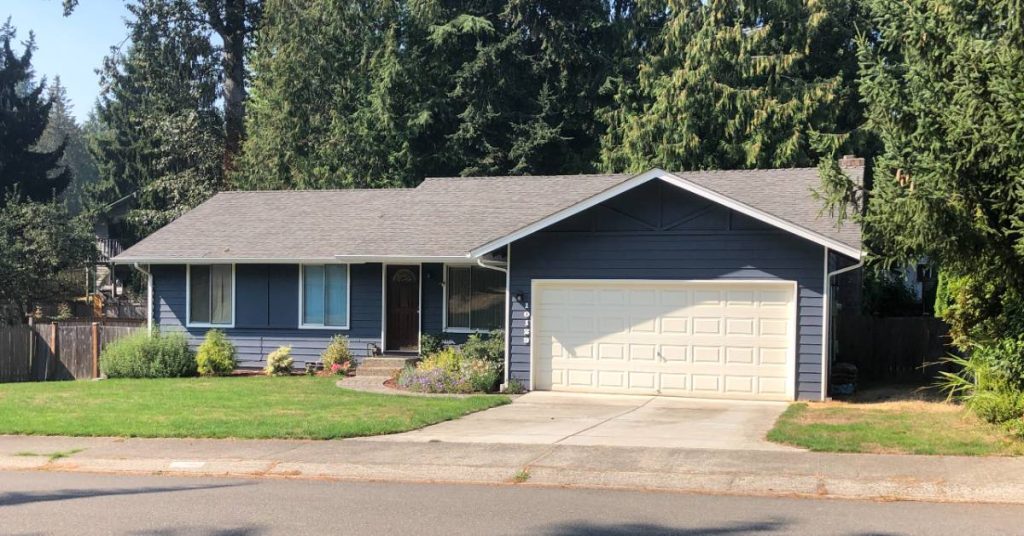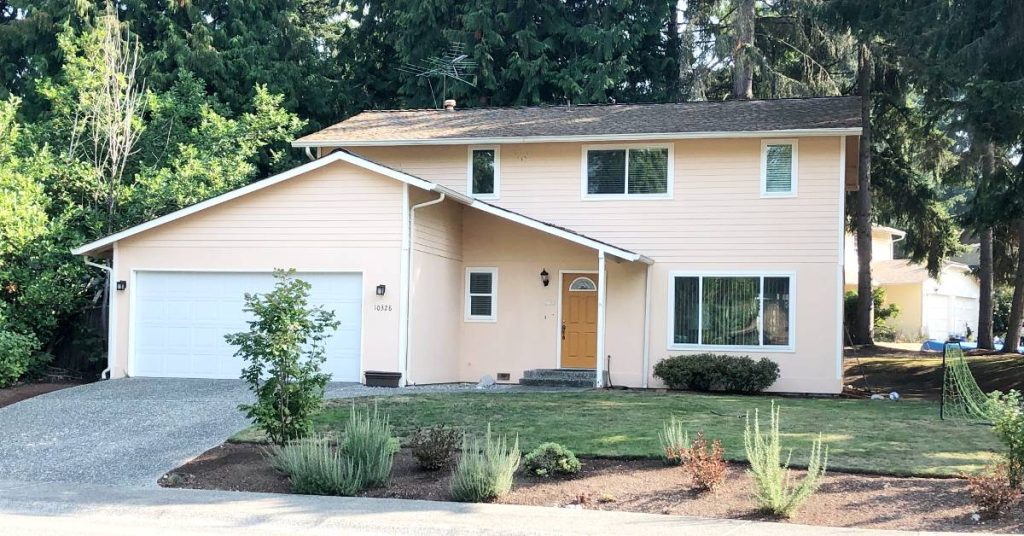Surprisingly, mortgage lenders let you qualify for the loan and even close before you’ve started your new job.
Armed with only an offer letter, you can buy a home.
Homebuyers who are changing jobs, recently graduated college, got a raise, or are relocating for work can now get an “offer letter mortgage.” Here’s how.
See if you can qualify for a mortgage with a job offer letter.
Offer letter mortgage requirements
Requirements will vary based on the loan type, but here are general guidelines.
- Non-contingent offer: No “subject to” language on the offer letter. If contingencies exist, they must be cleared prior to closing
- Start date: The letter must include a start date no later than 60-90 days after closing depending on the loan type
- Base income: The letter states the rate of pay. Only salary can be used to qualify; no commission, overtime, bonus, or other variable income
- Signed letter: The letter is signed by the employer and borrower
- Experience: Two years of work history or equivalent schooling or military service prior to the new job
- Non-family business: The future employment can’t be for a family-owned business
- Home type: Purchase of a 1-unit principal residence only
- Financial reserves: You may need 3-6 months of the full house payment in savings after closing
Let’s see how these rules play out in real-world situations.
Check your eligibility to buy a home using an offer letter.
Got a new job but haven’t started yet
You have a job but are about to make a change.
You are worried about using your current job on the loan application because the lender will find out at the last minute that you’ve changed jobs or will change jobs a few weeks after closing. This could jeopardize your home purchase.
You can apply for a mortgage now as long as the new job will start within 90 days of the loan closing (60 days for FHA).
That way, the lender will be fully aware that you plan to change jobs shortly after (or in the middle of) the loan process. It will approve you based on the new job, not your current one.
You are relocating for work
Getting a new job in another city would pose a big challenge if not for the offer letter mortgage.
Now, you can buy a home in the new location without renting for a time or otherwise moving twice.
Show the lender your offer letter which should include your new job’s location. Get your pre-approval and make an offer. Make sure the home is within commuting distance of the new job.
New remote job and you plan to move
Some workers take advantage of remote work policies at a new company and plan to move, well, wherever they want.
In this case, prepare a letter of explanation for remote work if you are moving but don’t need to be close to the new employer.
Start your offer letter mortgage.
Salary increase
You might not be changing jobs at all but will receive a significant raise in the next 60-90 days.
You can use your expected income level to qualify. Simply follow the same rules as if it were a new job.
Recent college grad
You can be approved for a mortgage with a job straight out of college without two years of work history.
Provide the lender the offer letter along with school transcripts verifying you have been in school the past two full years.
However, USDA home loans no longer allow you to use education as a substitute for work history. You need one year on the job to qualify.
Separating from military service
Those entering the civilian workforce after serving can get a mortgage right away by showing an offer letter and proof of military service for the most recent two years.
Be sure to check your eligibility for the zero-down VA home loan before considering a conventional, FHA, or USDA loan.
Check your VA loan eligibility.
New job after employment gap
Qualifying will be tougher if you’ve had a gap between jobs.
- Gaps less than 6 months: You will need an offer letter and your first pay stub to close
- Gaps longer than 6 months: You will need to be on the new job for six months to qualify
Some loan types may require you to be back on the job up to 12 months, so check with your lender about your situation.
Offer letter mortgages for conventional, FHA, VA, and USDA loans
Each loan program reviews offer letter situations a litte differently. Here’s what to expect based on your loan type.
Fannie Mae conventional
The easiest path for a Fannie Mae conventional loan is to supply a pay stub before closing.
If this isn’t possible, the job must start within 90 days of loan closing. You must be buying a 1-unit primary residence.
You must have financial reserves after paying the down payment and closing costs as follows:
- Six months of the principal, interest, taxes, insurance, and HOA dues for the new home
- Reserves for the full housing plus debt payments for the time between loan closing and start date, plus one month
| Start date 60 days after closing | Start date 90 days after closing | |
| Full house payment | $2,000 | $2,000 |
| All other debts | $500 | $500 |
| 6 months housing payment | $12,000 | $12,000 |
| Months reserves for housing + all debts | 3 | 4 |
| All-debt reserve minimum | $7,500 ($2,500 X 3 months) | $10,000 ($2,500 X 4 months) |
| Reserves required | $7,500 | $10,000 |
In the above example, three or four months of total housing and debt payments were less than six months of the house payment. So the lesser amount was used.
If your current job will continue after closing, you can use that income toward the reserve requirement.
Supply your first pay stub prior to closing if possible. The above reserve rules won’t apply.
Start your convention home purchase loan.
Freddie Mac conventional
Freddie Mac largely follows Fannie Mae’s guidelines above, with a few exceptions
- For a new job (not a raise), and with a first pay stub, you may purchase or refinance (including a cash-out refinance) a 1-4 unit primary residence, 1-unit second home, or 1-4 unit investment property
- Financial reserves are required as described above, but only if the employment starts more than 15 days after closing.
FHA
FHA loans allow you to use income from a new job, raise, or upcoming retirement that will start within 60 days of closing (not 90 days like conventional).
You must have financial reserves in the amount of the future house payment plus all debt payments between the closing date and employment start date.
For example, your job starts 60 days after loan closing. Your future house payment plus auto loan, student loan, and credit card minimum monthly payments are $3,000 per month. You would need financial reserves of $6,000, less any income from your current job after closing.
USDA loans
USDA loans follow FHA rules as described above. Your job must start within 60 days of closing and you must have adequate reserves to cover the house payment and debts between the closing date and employment start date.
VA loans
For VA loans, it’s easier to get a mortgage based on an offer letter if you’re separating from service. In fact, you have to supply one if you are qualifying within 12 months of leaving the military.
You may also get a mortgage by supplying proof of re-enlistment.
If you’re already in the civilian workforce and changing jobs, VA lenders allow you to close the loan without your first pay stub assuming an acceptable offer letter. Typically, you need to start within 30 days of closing and have adequate reserves for the time in between, but that can vary by lender.
Getting a mortgage with an offer letter: Not as hard as it seems
Mortgage lenders understand that life isn’t always neat and tidy. Sometimes timing isn’t the greatest when buying or refinancing a home.
Luckily, this lending provision helps countless job movers secure home financing each year.




